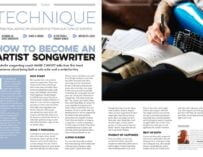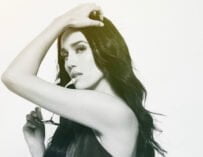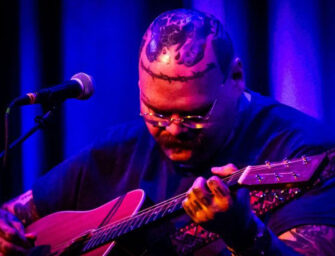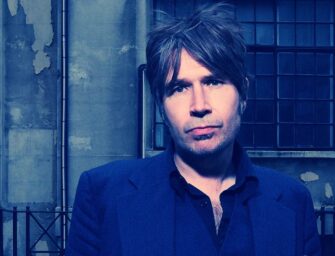
RuthAnne: “People need to buy into the whole package, who you are and what you have to say.”
This successful Irish songwriter is making her move for solo stardom. Here are her tips on how to change lane
RuthAnne is a songwriter best known for her contributions to songs for the likes of Niall Horan, Britney Spears and Martin Garrix – that is, until now, for the writer of smash hits like JoJo’s Too Little Too Late is branching out as an artist in her own right. The release of new single, It Is What It Is, provides early evidence that she has made the right decision, showcasing her own stirring voice and elegant pop stylings.
Here, the Irish songwriter provides her 10 essential tips for making that transition from songwriter to artist…
1. Find your own voice & perspective
“As a songwriter, you spend a lot of time in a room with artists trying to help them tell their stories, with the end game being to give them the biggest songs of their careers. This is pretty confusing as an artist; you’re jumping around so many different genres, which makes it really hard to pin down your own sound.
“As an artist, the main thing I focused on was finding my own voice, sound and lyrical perspective – without that there is no identity, it’s just songs. People need to buy into the whole package, who you are and what you have to say.
“All my favourite artists have a lyrical perspective that I connect with. For me, being truthful about my experiences living in LA, enabled me to write very personal and authentic lyrics. That was how I cracked the code for understanding who I am as an artist.
“When I left LA for a three-week writing trip, I just went in and wrote whatever I wanted and it was incredibly liberating. Just me and the producer, not thinking about anything other than being honest and singing in the way that was most natural to me. I wrote most of my first album in those three weeks. You can’t force that process though, let it come naturally and when it does just go with it.”
2. Know what to expect
“It’s so important when transitioning from songwriting for big artists to manage your expectations and understand that you are starting from scratch as an artist in your own right. You don’t have the same platform or fan base as the artists you’ve written for.
“For example, I wrote Slow Hands for Niall Horan and In The Name Of Love for Martin Garrix and combined they have over a billion streams, and on the first day of release will get a few million. For me to expect the same for my own artist releases, would be setting myself up for failure and disappointment. You have to forget about that and remember that those artists built their fanbases first and spent years building up to that level, it doesn’t happen overnight. So manage your expectations and don’t get down on yourself because your first song hasn’t reached a billion streams yet!”

RuthAnne: “Songwriting artists need to forget about the stigma, judgements and opinions and just be themselves.”
3. Shaking the ‘stigma’
“Over the years, especially my early days as a songwriter, I’ve found that there was a massive stigma around songwriters becoming artists. Almost like, ‘Well she’s JUST a songwriter.’ Just a songwriter? Hang on a minute, aren’t we the ones writing songs that people all around the world are singing?
“In meetings, I’d be asked, ‘So you wanna be an artist?’ I’d think, I don’t want to be, I am and always have been an artist. I believe everyone who creates music is an artist. We are all creating art. Some people want to stay behind the scenes, some want to perform and put themselves out there. No one has the right to tell people who and what they are.
“I realised I had to find the people who believed I could go out there and do it myself. Songwriting artists need to forget about the stigma, judgements and opinions and just be themselves. Nowadays with indie artists becoming huge success stories without being tied to a major record label, more and more songwriters are out there making music for themselves and I couldn’t be happier about that. Rightly that stigma is diminishing, and songwriters are getting the chance to step out from behind the scenes, to front and centre and have success in their own right, as well as continuing to write songs for other artists.”
4. Do both
“I’ve found that by releasing my own music, building my own fanbase and connecting with people all over the world, I’ve been exposed to even more opportunities as a songwriter. Some people come to me for the hits I’ve written for other people, but now certain artists are interested in working with me based on my music as a solo artist.
“The Vow was the first single I released as an artist and is a great example. I was at an event in LA and Yebba, a new artist who I adore, was there too. I went over to say how much I loved her and how I would love to write for her. I named some hits I’d written to help my case and well, she just didn’t care about any of those songs, but then said, ‘Wait a minute, what’s your name again?’ She was elated and said, ‘OMG RuthAnne! Like The Vow RuthAnne? I love that song, let’s do something together.’ That moment was so huge for me as an artist and I realised that doing both was so important. Being both an artist and a songwriter will create opportunities for each other. If you can balance both, always do both, be a brand, be a queen.”

RuthAnne: “If you are transitioning from songwriter to artist, get ready for a whole other set of hours!”
5. Find your teams
“This part is so important. Find people who champion you as an artist because if they are just interested in your songwriting you will never fully have the support you need to move forward. I have an amazing management team who help with both parts. They got me in the room with John Legend to write No Place Like Home on his latest Christmas album, along with opening for Alanis Morrisette on her tour and performing on Jimmy Kimmel.
“You need teams that will help move your career forward, get the best for you and can manage your schedule in an effective way for both your songwriting and your artistry. Also, when I was transitioning to focusing more on being an artist, I chose my writing/producing teams because they understood my vision and believed in me as an artist. I have other great songwriting partnerships that I work with for other artists, that’s all kept separate for clarity. I’ve kept it that way to this day.”
6. Another set of hours
“If you are transitioning from songwriter to artist, get ready for a whole other set of hours! As a writer we show up, we write the song, we go home. We don’t have to do anything to promote the song, our job is done. As an artist, you have to be on call 24\7, especially the type of artist like me who is running the ship. I am involved in everything: the production, the mixing, the artwork.
“Every decision is ultimately mine, after talking it over with my team. Then there’s the promo, the interviews, photo shoots, social media, spending time with your followers, talking to them, building your fanbase, shows, performing, touring… It’s changed my lifestyle in the way that I have to take really good care of myself, so I’m healthy and can give good performances.
“Luckily, I love all this extra stuff, but it’s definitely something you have to be prepared to do to get your music out there as an artist. I have so much respect for artists and the amount of energy and work ethic it takes to be one.”

RuthAnne: “The best piece of advice I’ve been given… ‘If you can write one great song, you can always write another.’”
7. Don’t take back songs
“So, I’ve always had a rule that if I go in to write with an artist, producer or another writer for pitching to other artists, I’ll never take the song back for my own project and say, ‘Oh actually I want this for me’. This will obviously create a lot of tension within your teams. I am always very clear about who we are writing for at the beginning of the session. The only time I would ever consider taking a song back as my own, would be if the song is getting no bites, or if the artist doesn’t want it anymore. I’ll then be like, ‘I think I’ll keep this one,’ but I always check with my co-writers first and get everyone’s blessing.
“If I happen to write the biggest best song ever, that would be so perfect for me, but I’m in the room with Kelly Clarkson and she loves it for her and it was written with her, for her and it wasn’t meant to be for me, I stay true to that. Keeping your relationships good in the industry is so important. And the best piece of advice I’ve been given as a songwriter is, ‘If you can write one great song, you can always write another,’ and that’s so true.”
8. You have to live to write
“It’s so important to take time to live and be inspired. Constantly working with no downtime, with no time to see the world and have those conversations that turn into songs, is not good for your artistry, or your songwriting. So many songs I’ve written come from life, from those moments out with my friends, from taking the time to go for a walk or see a movie. As an artist you never want to burn out, where you feel you have nothing to say, nothing to give.
“I used to feel so guilty taking any time off until I realised that most of my songs that are successful come from moments I experienced when I was just living my life on days off. Make sure you leave space to fit that time in.”

RuthAnne: “It’s impressive having a lot of streams, but it’s more impressive filling a room.”
9. The greatest show
“Transitioning from a songwriter to an artist involves being a performer. It’s always a goal of mine during my show to shut the entire room up and have a moment where it’s completely silent and my voice takes over the crowd. And then a moment where I grab the audience and have them singing along with me, I want my audience to feel something.
“It’s so important these days to not only release great music but have a great show, a show that people will talk about for days after. For 50 people, 500 or 50,000 it doesn’t matter how big or small the show is, that’s your chance to shine as an artist. Whether you’re the supporting act performing in front of new audiences or you’re headlining, connect with your fans and make a name for yourself as a great live performer, that will create a lifelong career as a live performer. Give your followers a reason to get out of the house and come see you play live. It’s impressive having a lot of streams, but it’s more impressive filling a room. Make your show something people wouldn’t want to miss.”
10. Trust the process
“Don’t force anything, take the opportunities you feel are best for you, trust your instincts, create an artist brand that’s true to who you are. Keep the things about yourself that people tell you to change. For example, Ed Sheeran was always told to dye his red hair, but that was one of the things that made him stand out. Keep that special unique thing about you, find your audience and play to them.
“Write songs forever and keep being inspired. Never let the business side of the music industry get you down; keep it about the music, the music will always win in the end. It’s about the song! As an artist, it doesn’t matter how beautiful you are, how quirky you are, how great you sing – the main thing you need is THE SONG.”
RuthAnne’s new single It Is What It Is comes out on 23 November via The Other Songs. For more info, head to thisisruthanne.com



































Related Articles